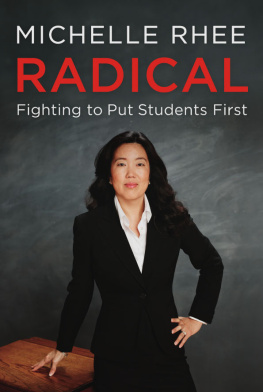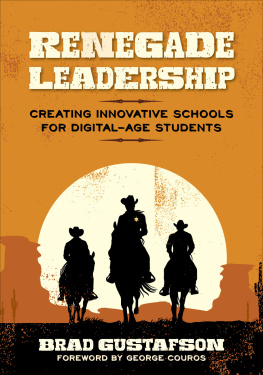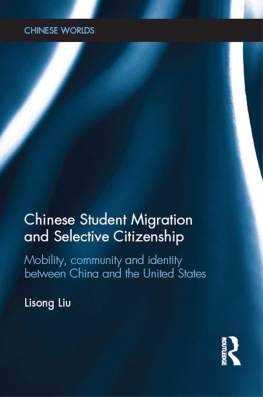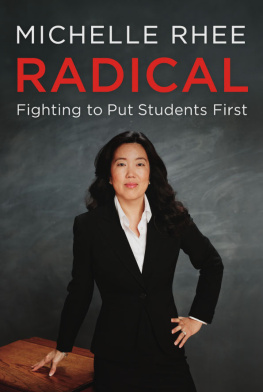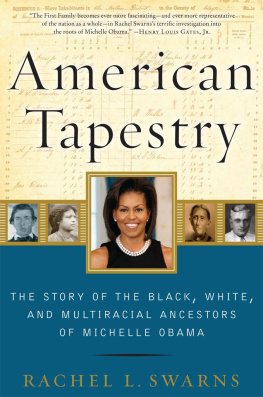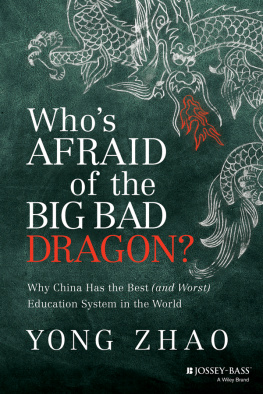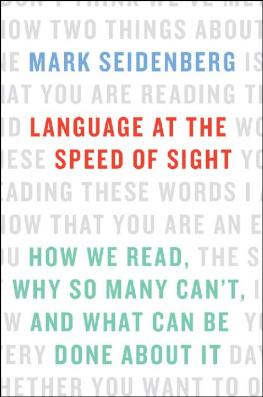T O THE CHILDREN OF W ASHINGTON , D.C., WHO DESERVE THE BEST SCHOOLS IN THE WORLD
Contents
A few weeks before graduating from college, I faced a choice between two very different paths into my future.
One would take me to graduate school to study labor relations. My mind was brimming with ideas about how to improve manufacturing production through educational incentives for workers and their families. I had been accepted to programs at Rutgers and the University of Illinois.
The other would take me to a public school classroom. I had become intrigued by Teach For America, a relatively new organization in 1992 that trained college graduates to work in public schools in low-income communities.
Graduate school appealed to my practical side, the one that would satisfy my hard-driving mother. Get trained! Get a job! Get married!
Teaching spoke to the part of me that had been growing stronger since I was a teen in Toledo, Ohio, volunteering at a local elementary school. My father always taught my brothers and me that the person who has the ability to do more than take care of her own should give back to the community. Dont just think of yourselves, he would tell us.
So as my college days came to an end, I was caught between two conflicting choices. I struggled. Two weeks before graduation, I called my grandmother in Seoul, South Korea. My mothers mother had always given me good counsel. I described my dilemma.
What should I do, Halmuhnee ? I asked.
She paused. As a young woman, she had taught kindergarten. I knew she was considering my question.
Go teach, she said.
But the school was in a poor neighborhood in Baltimore, I explained, a city I knew nothing about.
Its going to be really tough, I told her.
Its little kids, she said. Whats hard about that?
Little did my grandmother know how hard the next few years as a teacher would be for me. Or how rewarding. Little did she know that my experiences in the classroom would lead me on an odyssey, from my rage at the failures of the public education system to my resolve to change that system. Making sure schools in America engage, teach, and prepare studentsregardless of where they come from or how they arrive at schoolhas become my lifes work. I am committed to creating a sense of honor for teachers in our country, and to rewarding them for success in the classroom. Somewhere along the way our country has lost the expectations that all children can learn and excel, along with our regard for teachers.
America is the greatest country in the world. But that status is at risk. The United States will not maintain that leadership rolefrom commerce to military might to moral authorityif we as a nation continue to allow our public schools to deteriorate.
A report by the Georgetown University Center on Education and the Workforce found that the U.S. economy will create 46.8 million new and replacement jobs in the next five years, 63 percent of which will require some college education. Yet were failing to produce the well-trained American workers we need to fill these positions. Half of businesses report that they cant find the workers they need to hire for vacancies they have. And the truth is that when we fail to fill these positions, theyll inevitably have to be outsourced to places like China and India, or other countries where young people have the skills and knowledge they need to be successful in those roles. This is a significant problem that will consign America to decline.
True, America still generates some of the worlds best patents, ideas, and businessesFacebook, Google, and Apple, for starters. But if the programmers are in India, the engineers are in South Korea, and the software developers are in Singaporewhere does that leave us?
Two summers ago, I heard the prime minister of Singapore, Lee Hsien Loong, speak before an annual gathering of media executives. When the topic turned to competing in the global economy, he chose to discuss education. He said that when his country set its sights on entering the global market and winning its share, it decided it must first create a strong education system. If its children were not prepared to compete, how could Singapore hope to gain a foothold against the United States, Germany, or China? The country made sure to establish a first-class education system that was linked to the financial and commercial sectors. Seems obvious: invest in education and you ensure a strong workforce and vibrant economy. But in the United States we see education as a social issue, rather than an economic one. When budgets get cut at federal, state, and local levels, education often falls first under the ax. That, too, must change if we hope to compete.
In America in 2012, birth determines possibilities. A poor kids chances of graduating from college are one in ten. Of all developed nations, America is near the bottom in terms of social mobility. If you told me the race of a child and the zip code in which she lives, I could, with pretty good accuracy, tell you her academic achievement levels. Thats the most un-American thing I can imagine! This is supposed to be the land of equal opportunity. But for Americas children, its not. Where you live and the color of your skin largely determine your lot in life. In my mind, that is nothing less than criminal. And it will come to define who we are as a nation unless we do something dramaticsomething truly radicalto reverse this reality.
Wealth and class do not ensure a quality public school. Middle- and upper-middle-class children and their parents suffer from mediocrity in the classroom, as well. First-rate suburbs have second-rate schools that are failing to prepare children to get good jobs, create new companies, or innovate. And often, these families dont even know it.
The poorest kids in America (the bottom quartile economically) rank twenty-sixth out of thirty developed nations in math compared with their peers. Our richest kids? They also rank twenty-sixth out of thirty in their peer group. Middling schools are not a problem confined to our ghettos. They plague every neighborhood and community across the nation.
My aim is to bring excellence back to public education by making sure that laws and policies have one goal: to educate students well. What I learnedfrom teaching at Harlem Park in Baltimore to creating The New Teacher Project to running the Washington, D.C., schoolsis that a great teacher can inspire and help any child learn, regardless of that childs circumstances. He or she can come to class hungry from a filthy apartment and a single parent selling drugs, or a posh mansion where the parents are too busy making money to care about their kids. When they get to a good school in front of a terrific teacher, they can learn.
The education agenda in the United States for the last thirty years has been driven largely by the teachers unions and many other special interests, from the textbook publishers to the testing companies. Students have often been neglected in the process, and our standing among other nations has suffered. Students in the United States rank fourteenth in reading, seventeenth in science, and twenty-fifth in math, according to the 2009 study of thirty-four countries by the Programme for International Student Assessment.
The predicament has only grown more desperate in the past two years.
In these chapters you will learn about my awakening to the potential that every child can learn, given a great teacher; my rage at realizing that adults and special interests were blocking change that could bring and keep great teachers in classrooms; and my realization that it would take a grassroots movement to break through the barriers standing in the way of making public schools work for students.

